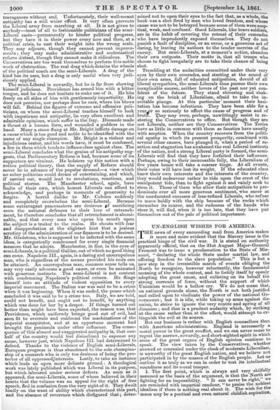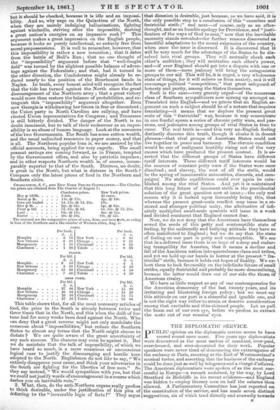UN-ENGLISH WISHES FOR AMERICA.
THE news of every succeeding mail from America makes it more and more evident that the Slavery issue is the practical binge of the civil war. It is stated on authority apparently official, that on the 31st August Major-General Fremont was to issue a proclamation to the State of Mis- souri, " declaring the whole State under martial law, and offering freedom to the slave population." This is but a new step in the irresistible march of events obliging the North to recognize, however reluctantly, the fundamental meaning of the whole contest, and to fortify itself by openly adopting the great cause, and enlisting on its behalf the strong currents of force, without the support of which Unionism would be a hollow cry. We do not mean that, on national grounds alone, the North is not both justified and called upon to vindicate the power of the national Go- vernment ; but it is idle, while taking up arms against dis- union, to strive to ignore the very centre and spring of all disunion ; and that is a prudent audacity which, by striking at the cause rather than at the effect, would attempt to ex- tinguish the evil at its source. But our business is rather with English counsellors than with American administration. England is necessarily a moral power in the great conflict, and we can never cease to regret the narrow, cowardly, and short-sighted spirit in which some of the great organs of English opinion continue to speak. The view taken by the Conservatives, whether avowed or concealed under the cloak of moderate Liberalism, is unworthy of the great English nation, and we believe not participated in by the masses of the 'English people. Let us outline it as truly as we can in order to test its intellectual soundness and its moral temper. 1. The first point, which is always and very skilfully assumed as the basis of the argument, is that the North are fighting for an impossibility. " It can never be right," we are reminded with impartial candour, " to praise the noblest idealism if there is nothing real about it. The wish for the moon may be a poetical and even natural childish aspiration, but it should be checked, because it is idle and an impossi- bility. And so, why urge on the Quixotism of the North, when they are merely indulging hallucinations, fighting against windmills, striving after the impossible, dashing a great nation's energies on an impassive rock ?" This argument makes a great impression on the English people, because it looks so purely intellectual, so entirely free from moral prepossessions. It is well to remember, however, that this impossibility is rather a new invention; that it dates from the battle of Bull's Run ; that no one thought of the "impossibility" argument before that "well-fought field" was turned by the slightest possible balance of advan- tage against the Federalists ; and that, had it turned in the other direction, the Confederates might already be re- duced nearly to the position of the Bourbonist bands in Naples. In truth, every honest mind will recognize the fact that the tide has turned against the North since the great discouragement of the Northern army ; that a great victory would more than restore the balance of probabilities, and ex- tinguish this "impossibility" argument altogether. Even now Georgia is withdrawing her forces in fear or discontent ; the Union party in North Carolina are rallying, and have elected Union representatives for Congress; and Tennessee is still bitterly divided. The danger of the North is no doubt imminent, but to talk of their endeavour as an impos- sibility is an abuse of human language. Look at the resources of the two Governments. The South has some cotton wealth, and the usual unlimited resources in paper money, and that is all. The Northern popular loan is, we are assured by the official accounts, being applied for very eagerly. The small peasant savings are coming forward, as in France, tempted by the Government offers, and also by patriotic impulses; i and in other respects Northern wealth is, of course, incom- parably superior to that of the South. Distress, no doubt, is great in the North, but what is distress in the South ? Compare only the latest prices of food in the Northern and Southern cities.
CHARLESTON, S. C., AND NEW YORK PRICER CONTRASTED.—The Charles- ton prices are obtained from The Courier of August 7:
Charleston prices. New York prices. Hay v 100lb. . . . . 8 dohs. 45 cents.
Bacon v lb. . . . . 14c. @ 17c. 4fc. @ 10c.
Corn per bushel . . . ld. 15c. @ id. 25c. 56c.
Rice ap. lb. 21c @ 3iC. 5Ic• @ 6}c. Flour v bbl 7d 33c. @ 8d. 5d. 50c. @ 7d. 25c. Lard 14c @ 15c. 84c. @ Butter 40c @ 50c. 10c. g 15c.
The annexed are the comparative prices of corn, flour, and mess pork, as ruling in four of the Southern and a like number of Western cities, Aug. 5:
CORN.
Per bush. Per bush.
d. c.
d. c.
Memphis 0 70 New York 0 45 New Orleans . . . . 0 80 Chicago 0 21
tfairtiznery . .
. . 1 10 1 20 Cincinnati Toledo 0 28 0 28
FLOUR.
Per bbl.
d. c.
Per bbl.
d. c.
Memphis 8 60 New York 4 5 New Orleans . . . 9 50 Chicago 3 50 Montgomery . . . 10 00 Cincinnati 4 50 Charleston 7 50 Toledo 4 50
BIERS PORK.
Per bbl.
d. c.
Per bbl.
d. c.
Memphis 27 00
New York
15 00 New Orleans . . . . 26 00 Chicago 15 50 Montgomery . . . . 26 00 Cincinnati 14 75 Charleston 27 50 Toledo 16 00
This table shows that, for all the most necessary articles of food, the price in the South is already between twice and three times that in the North, and this when the drift of for- tune had for many weeks been dead against the North. Who can deny that a great reverse might not only annihilate the nonsense about " impossibilities,' but reduce the Southern States to almost any terms that the North might choose to dictate ? We are quite aware of the great uncertainty of any such success. The chances may even be against it. But we do maintain that the talk of impossibility, of which we have heard so much, is a mere conscious or unconscious logical ruse to justify the discouraging and hostile tone adopted to the North. Englishmen do not like to say, " We entirely disapprove your cause, and think your adversaries in the South are fighting for the liberties of free men." So they say instead, ` We would sympathize with you, but that we could not justify words of encouragement in a course which dashes you on inevitable ruin." 2. What, then, do the anti-Northern organs really profess to think desirable, under the justification of this plea of deferring to the " inexorable logic of facts ?" They argue that disunion is desirable, just because, as we have said, it is the only possible step to a conclusion of this " causeless and fratricidal strife ;" and next—of course, only as an after- thought, and as an humble apology for Providence, and "justi- fication of the ways of God to man," now that the inevitable necessity stands revealed—for further reasons discovered as beautiful adaptations to the moral exigencies of the country, when once the issue is discerned. It is discovered that it will be very much for the advantage of the States to be dis- solved into rival groups. They will mutually check each other's ambition ; they will neutralize each other's power, and—if ever England should get into a dispute with one or more of them—mere jealousy will bring the antagonistic groups to our aid. This will be, it is urged, a very wholesome state of things, for it will relieve us from anxiety, and it will encourage political "competition," that great safeguard of honesty and purity, among the States themselves. Such is the case—very gravely urged—of the numerous class of Southern sympathizers now sprung up amongst us. Translated into English—and we grieve that an English ar- gument on such a subject should be of a nature that requires translating—it means that we deplore the present great scale of this " fratricidal" war, because it may concentrate in one fearful spasm a series of chronic petty wars, and pas- sions, and jealousies among groups of rival States in time to come. The real truth is—and this very un-English feeling distinctly discerns this truth, though it cloaks it in decent phrases—that rival groups of American States could not live together in peace and harmony. The chronic condition would be one of malignant hostility rising out of the very causes which have produced the present contest. It is as- serted that the different groups of States have different tariff interests. These different tariff interests would be the sources of constant petty wars if the States were once dissolved ; and slavery, the root of all the strife, would be the spring of innumerable animosities, discords, and cam- paigns: No stable equilibrium could ever again be esta- blished among the rival States. And yet it is maintained that this long future of incessant strife is the providential solution of the great question now at issue ;—the only real reason why it is looked upon favourably being this, that whereas the present great-scale conflict may issue in a re- stored and stronger political unity, the alternative of infi- nitely multiplied small-scale quarrels will issue in a weak and divided continent that England cannot fear.
Now, we do not deny that the Americans have themselves sowed the seeds of this petty and contemptible state of feeling, by the unfriendly and bullying attitude they have so often manifested to England ; but we do say that the state of feeling on our part is petty and contemptible. We see that in a deferred issue there is no hope of a deep and endur- ing tranquillity for America, that it means a decline and fall of the American nation into quarrelsome clans and tribes, and yet we hold up our hands in horror at the present " fra- tricidal" strife, because it holds out hopes of finality. We ex- hort them to look favourably- on the indefinite future of small strifes, equally fratricidal and probably far more demoralizing, because the latter would draw out of our side the thorn of American rivalry.
We have as little respect as any of our contemporaries for the American democracy of the last twenty years, and its irritating and blustering foreign policy; but we must say this attitude on our part is a shameful and ignoble one, and is not the right way either to attain or deserve consideration among that excitable and thin-skinned people. Let us pull. the beam out of our own eye, before we profess to extract the mote out of our cousins' eyes.































 Previous page
Previous page